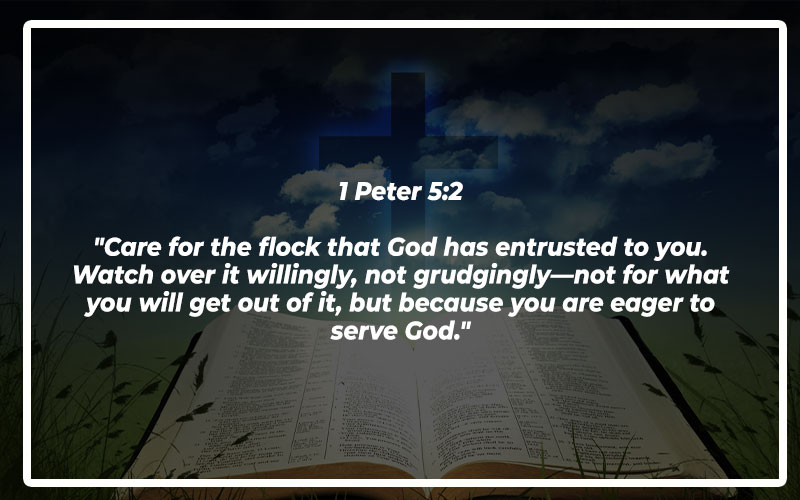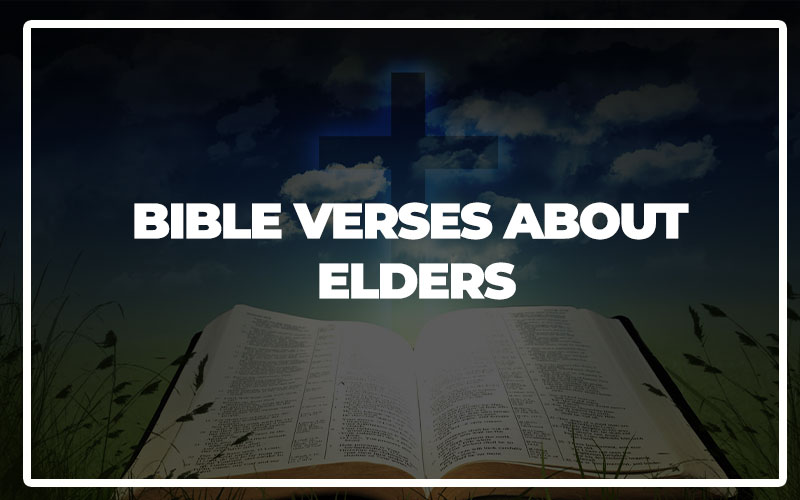In the Bible, elders hold a position of wisdom, leadership, and guidance within the community of believers. Their role reflects God’s design for orderly spiritual leadership and care for His people. The Scriptures provide us with profound insights into the responsibilities, character, and value of elders. Below are Bible verses that features all you need to know about elders. Do read on!
Also Read: Bible Verses About Respecting Elders
The Role of Elders in Leadership
Elders in the Bible are often depicted as leaders who are entrusted with the responsibility of shepherding and guiding God’s people. Their role involves teaching, spiritual oversight, and maintaining the unity of the church. The following verses highlight the leadership role of elders.
1 Peter 5:2
“Care for the flock that God has entrusted to you. Watch over it willingly, not grudgingly—not for what you will get out of it, but because you are eager to serve God.”

This verse emphasizes the heart of a true leader—caring for God’s people out of a sincere desire to serve rather than for personal gain. Elders are called to willingly shepherd the flock, reflecting God’s loving and sacrificial care for His children.
1 Timothy 5:17
“Elders who do their work well should be respected and paid well, especially those who work hard at both preaching and teaching.”
Here, Paul acknowledges the diligence of elders in their ministry, especially those who labor in teaching and preaching. Their commitment to the Word of God and to the church warrants respect and support from the congregation.
Titus 1:7
“An elder is a manager of God’s household, so he must live a blameless life. He must not be arrogant or quick-tempered; he must not be a heavy drinker, violent, or dishonest with money.”
This verse outlines the high standards of character required for elders. As managers of God’s household, they must embody integrity, humility, and self-control, serving as examples to others.
Acts 20:28
“So guard yourselves and God’s people. Feed and shepherd God’s flock—His church, purchased with His own blood—over which the Holy Spirit has appointed you as leaders.”
Paul’s charge to the elders in Ephesus underscores their sacred duty to protect and nurture the church. The reference to the church as being “purchased with His own blood” highlights the profound responsibility and privilege of this role.
Proverbs 11:14
“Without wise leadership, a nation falls; there is safety in having many advisers.”
While not specifically about church elders, this verse underscores the value of wise counsel and leadership. Elders provide a stabilizing influence through their guidance, ensuring the spiritual health and direction of the community.
The Qualifications of Elders
The Bible provides clear guidelines for the character and behavior expected of elders. These qualifications ensure that elders are prepared to lead by example and maintain the spiritual integrity of the church.
1 Timothy 3:2
“So an elder must be a man whose life is above reproach. He must be faithful to his wife. He must exercise self-control, live wisely, and have a good reputation.”
This verse establishes the moral and relational integrity required of elders. Their personal lives must align with the principles of the gospel, serving as a testimony to their faith.
Titus 1:6
“An elder must live a blameless life. He must be faithful to his wife, and his children must be believers who don’t have a reputation for being wild or rebellious.”
This verse adds to the qualifications by highlighting the importance of an elder’s family life. Their ability to lead their own household reflects their capacity to lead the church effectively.
1 Timothy 3:7
“Also, people outside the church must speak well of him so that he will not be disgraced and fall into the devil’s trap.”
This verse stresses the importance of an elder’s reputation beyond the church community. A strong and respectable character in the eyes of outsiders not only brings honor to the church but also guards against falling into sin and dishonor.
1 Peter 5:3
“Don’t lord it over the people assigned to your care, but lead them by your own good example.”
Peter calls for humility in leadership, urging elders to lead through example rather than domineering authority. Their actions and conduct should inspire others to follow Christ faithfully.
James 3:1
“Dear brothers and sisters, not many of you should become teachers in the church, for we who teach will be judged more strictly.”
This warning highlights the gravity of spiritual leadership. Elders, as teachers and leaders, bear significant responsibility and accountability before God for their words and actions.
The Responsibilities of Elders
Elders are entrusted with various responsibilities, including teaching, oversight, and ensuring sound doctrine within the church. The following verses highlight the multifaceted role of elders in nurturing the spiritual growth of believers.
2 Timothy 2:2
“You have heard me teach things that have been confirmed by many reliable witnesses. Now teach these truths to other trustworthy people who will be able to pass them on to others.”
This verse underscores the responsibility of elders to disciple and equip others. Their role involves passing on sound doctrine to trustworthy individuals, ensuring the continuation of biblical teaching.
Ephesians 4:11-12
“Now these are the gifts Christ gave to the church: the apostles, the prophets, the evangelists, and the pastors and teachers. Their responsibility is to equip God’s people to do His work and build up the church, the body of Christ.”
This passage highlights the collaborative role of church leaders, including elders, in equipping believers for ministry and strengthening the church as a unified body.
1 Thessalonians 5:12
“Dear brothers and sisters, honor those who are your leaders in the Lord’s work. They work hard among you and give you spiritual guidance.”
Paul calls for recognition and respect for leaders who labor in teaching and spiritual care. Elders dedicate themselves to guiding others in their faith journeys, deserving gratitude and honor for their service.
Acts 15:6
“So the apostles and elders met together to resolve this issue.”
This verse reflects the collaborative decision-making role of elders in the early church. Their wisdom and guidance were integral to addressing doctrinal and practical matters, maintaining unity within the church.
Hebrews 13:17
“Obey your spiritual leaders, and do what they say. Their work is to watch over your souls, and they are accountable to God. Give them reason to do this with joy and not with sorrow. That would certainly not be for your benefit.”
This verse emphasizes the accountability of elders to God for their care of the church. It also encourages believers to support and honor their leadership to foster a joyful and effective ministry.
The Importance of Wisdom in Elders
Wisdom is a foundational quality of elders, enabling them to provide sound guidance and make discerning decisions for the spiritual welfare of the church. These verses highlight the significance of wisdom in their role.
Proverbs 4:7
“Getting wisdom is the wisest thing you can do! And whatever else you do, develop good judgment.”
This verse underscores the value of wisdom and good judgment, essential qualities for elders who are entrusted with leading and making decisions for God’s people.
James 1:5
“If you need wisdom, ask our generous God, and He will give it to you. He will not rebuke you for asking.”
James encourages leaders to seek wisdom from God, assuring them of His generosity. Elders must rely on divine guidance to lead effectively and handle challenges with grace and insight.
Proverbs 16:16
“How much better to get wisdom than gold, and good judgment than silver!”
This verse highlights the incomparable value of wisdom, reminding elders to prioritize spiritual riches over material wealth as they lead God’s people.
Colossians 3:16
“Let the message about Christ, in all its richness, fill your lives. Teach and counsel each other with all the wisdom He gives. Sing psalms and hymns and spiritual songs to God with thankful hearts.”
This passage connects wisdom with the message of Christ, urging elders to teach and counsel others from the richness of God’s Word, fostering a spirit of worship and gratitude within the church.
Proverbs 15:22
“Plans go wrong for lack of advice; many advisers bring success.”
This verse highlights the collective wisdom that elders bring to the church. Their collaborative counsel ensures well-thought-out decisions that benefit the entire community.
The Accountability of Elders
Being an elder is a position of great responsibility, and with it comes accountability to God. Elders must faithfully steward their role, knowing they will answer to the Lord for their actions and leadership. These verses emphasize the accountability of elders in their sacred duties.
Hebrews 13:17
“Obey your spiritual leaders, and do what they say. Their work is to watch over your souls, and they are accountable to God. Give them reason to do this with joy and not with sorrow. That would certainly not be for your benefit.”
This verse reminds us that elders are accountable to God for the spiritual well-being of their flock. It also encourages believers to support their leaders, enabling them to serve with joy rather than burden.
Luke 12:48
“When someone has been given much, much will be required in return; and when someone has been entrusted with much, even more will be required.”
This principle applies to elders, who have been entrusted with spiritual authority and leadership. Their accountability to God is heightened because of the significant responsibilities they carry.
1 Corinthians 4:2
“Now, a person who is put in charge as a manager must be faithful.”
Paul emphasizes faithfulness as a critical attribute for those in leadership. Elders, as stewards of God’s church, are called to faithfully carry out their duties with diligence and integrity.
Ezekiel 34:10
“This is what the Sovereign Lord says: I now consider these shepherds my enemies, and I will hold them responsible for what has happened to my flock.”
This stern warning highlights God’s expectation of accountability from those in shepherding roles. Elders must lead with care and integrity, knowing they are ultimately answerable to the Lord for their actions.
2 Corinthians 5:10
“For we must all stand before Christ to be judged. We will each receive whatever we deserve for the good or evil we have done in this earthly body.”
This verse serves as a sober reminder that all, including elders, will give an account to Christ. It encourages elders to lead with integrity and faithfulness, keeping their eternal accountability in view.
The Blessings of Elders’ Ministry
The ministry of elders is a source of blessing to the church. Through their faithful service, teaching, and guidance, they build up the body of Christ and contribute to its growth and unity. These verses highlight the blessings of their work.
Proverbs 27:17
“As iron sharpens iron, so a friend sharpens a friend.”

Elders play a crucial role in sharpening and encouraging believers. Their ministry strengthens the faith of individuals and the collective church, fostering spiritual growth and maturity.
Romans 12:8
“If your gift is to encourage others, be encouraging. If it is giving, give generously. If God has given you leadership ability, take the responsibility seriously. And if you have a gift for showing kindness to others, do it gladly.”
Paul reminds leaders, including elders, to embrace their gifts with diligence and joy. Elders who take their responsibilities seriously bring blessings to those they lead and the church as a whole.
1 Thessalonians 2:12
“We pleaded with you, encouraged you, and urged you to live your lives in a way that God would consider worthy. For He called you to share in His Kingdom and glory.”
This verse highlights the heart of an elder’s ministry—encouraging others to live lives worthy of their calling. Their labor inspires and blesses the church, pointing believers toward God’s glory.
Philippians 2:4
“Don’t look out only for your own interests, but take an interest in others, too.”
Elders exemplify selfless care for others, reflecting Christ’s humility and love. Their sacrificial ministry blesses the church, fostering a spirit of unity and mutual care among believers.
3 John 1:4
“I could have no greater joy than to hear that my children are following the truth.”
The joy of elders lies in witnessing the spiritual growth of those they shepherd. Their ministry is richly rewarding as they see lives transformed by the truth of the gospel.
The Role of Elders in Prayer and Healing
Prayer and spiritual care are central to the role of elders. They intercede for the sick, the hurting, and the congregation, bringing God’s presence and healing to His people. These verses highlight the prayerful ministry of elders.
James 5:14
“Are any of you sick? You should call for the elders of the church to come and pray over you, anointing you with oil in the name of the Lord.”
This verse underscores the important role of elders in prayer and spiritual healing. Their intercession brings comfort and demonstrates God’s care through the church community.
1 Samuel 12:23
“As for me, I will certainly not sin against the Lord by ending my prayers for you. And I will continue to teach you what is good and right.”
Samuel’s commitment to prayer and teaching serves as an example for elders, emphasizing their dual role in interceding for and instructing God’s people.
Colossians 1:9
“So we have not stopped praying for you since we first heard about you. We ask God to give you complete knowledge of His will and to give you spiritual wisdom and understanding.”
This verse reflects the continuous intercession elders make for their congregation. Their prayers focus on the spiritual growth and wisdom of those they serve.
Acts 6:4
“Then we apostles can spend our time in prayer and teaching the word.”
Although referring to apostles, this verse also highlights the elder’s focus on prayer and teaching. These responsibilities are foundational to their role in shepherding the church effectively.
Philippians 4:6
“Don’t worry about anything; instead, pray about everything. Tell God what you need, and thank Him for all He has done.”
Elders model a life of prayer, encouraging the church to bring all concerns before God. Through their example, they lead others into a deeper relationship with the Lord.
Also Read: Bible Verses About Treating Others With Dignity and Respect
What Does the Bible Say About Elders
The Bible speaks about elders as leaders in the church who are chosen to guide, teach, and care for the people of God. They are often referred to as shepherds, overseers, or pastors. Their role is very important because they help keep the church faithful to God’s Word and provide spiritual support to the congregation.
In the Old Testament, elders were respected leaders of Israel, chosen to help Moses in making decisions and leading the people (Exodus 18:17-26). They were known for their wisdom and experience and were trusted to give guidance in times of need.
In the New Testament, the role of elders is more clearly defined for the church. Paul instructed Timothy and Titus about the qualities of a good elder. Elders must be people of good character, faithful to their families, and able to teach the truth. They must not be greedy or quick to anger but must be humble, patient, and hospitable (1 Timothy 3:1-7, Titus 1:6-9).
Elders are also called to watch over the spiritual well-being of the church. In 1 Peter 5:1-3, Peter encourages elders to care for God’s people willingly and not for personal gain. They are to lead by example, showing others how to live in obedience to Christ.
The Bible makes it clear that elders have a special responsibility to serve, protect, and teach the people of God. They are accountable to God for how they lead. Christians are encouraged to respect and support their elders, trusting their guidance as they follow God’s Word (Hebrews 13:17). Elders are a gift to the church, helping believers grow stronger in faith and live in unity as the body of Christ.

